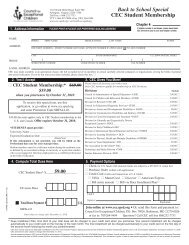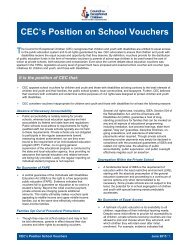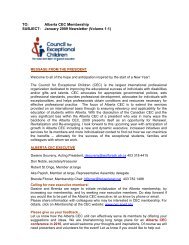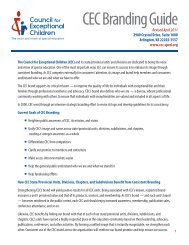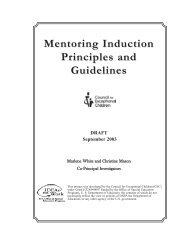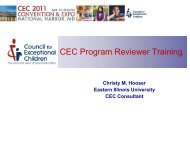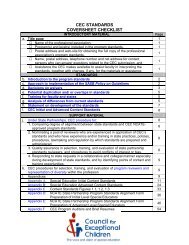What Every Must Know Special Educator - Council for Exceptional ...
What Every Must Know Special Educator - Council for Exceptional ...
What Every Must Know Special Educator - Council for Exceptional ...
You also want an ePaper? Increase the reach of your titles
YUMPU automatically turns print PDFs into web optimized ePapers that Google loves.
other field experiences with specific focus on<br />
learning about exceptional children from ethnic<br />
and multicultural groups.<br />
Paragraph 11 - High Stakes<br />
Assessment of Professional<br />
<strong>Know</strong>ledge, Skill, and Dispositions<br />
It is the <strong>Council</strong> <strong>for</strong> <strong>Exceptional</strong> Children’s (CEC)<br />
policy that, in determining an individual’s professional<br />
competence, multiple measures rather than a<br />
single test score shall be used in the decision making<br />
process to enhance the validity and reliability of decisions<br />
related to content and pedagogical competence.<br />
As a minimum assurance of fairness, when a test is<br />
used as part of the decision making process, the individual<br />
should be provided multiple opportunities to<br />
pass the test. If there is credible evidence that a test<br />
score may not accurately reflect the individual’s level<br />
of per<strong>for</strong>mance, the agency shall provide an alternative<br />
means by which the individual may demonstrate<br />
per<strong>for</strong>mance relative to professional standards.<br />
Background: The CEC recognizes the important role<br />
that standardized assessments play in documenting<br />
teacher competence to ensure that all children are<br />
provided with effective teachers. Developments in national,<br />
state and provincial policy are moving toward<br />
more rigorous assessment and accountability systems<br />
<strong>for</strong> teachers, most notably through provisions such<br />
as NCLB. CEC endorses various countries’ ef<strong>for</strong>ts to<br />
ensure that students with exceptional needs are guaranteed<br />
well-prepared teachers.<br />
However, CEC is concerned by the growing reliance<br />
of policy makers on use of a single high stakes test to<br />
make critical decisions about educators’ professional<br />
competence. Several states in the United States have<br />
already adopted policies that permit individuals with<br />
a bachelor’s degree, but no training in special education,<br />
to be fully licensed in special education if they<br />
achieve a passing score on a single test. NCLB includes<br />
a provision that defines a “highly qualified teacher” as<br />
one who passes a single test. Teaching is a complex activity.<br />
None of the currently available tests adequately<br />
assesses prospective special education teachers in both<br />
content and pedagogy. The use of a single test also<br />
raises serious validity issues and could have a negative<br />
impact on otherwise qualified persons. There is<br />
consensus in the teaching community that high stakes<br />
decisions should never rest on a single test score.<br />
276 whAt every SpeCiAl eduCAtor muSt <strong>Know</strong><br />
ChAPTER 02<br />
PROFESSIONAL STANDARDS, RIGhTS, AND<br />
RESPONSIBILITIES<br />
Paragraph 1 - Preamble<br />
As public awareness increases and public policies expand,<br />
new sets of conditions are created under which<br />
professionals in special education must function.<br />
While such awareness and policies may be powerful<br />
<strong>for</strong>ces <strong>for</strong> improvement in the field, they do not of<br />
themselves deliver appropriate education to persons<br />
with exceptionalities. Effective education <strong>for</strong> persons<br />
with exceptionalities is also dependent upon qualified<br />
professionals who work under appropriate standards<br />
and conditions and are able to ensure their own professional<br />
rights and responsibilities.<br />
Professionals must be adequately prepared and have a<br />
supportive environment which enables them to meet<br />
new demands. As advocates <strong>for</strong> persons with exceptionalities<br />
they must have the right to be responsive to<br />
and responsible <strong>for</strong> the vulnerable persons whom they<br />
serve. Finally, professionals must continually advance<br />
the knowledge, skills, behaviors, and values that make<br />
up the collective basis <strong>for</strong> practice and decision making<br />
<strong>for</strong> those working in the field. The combined energies<br />
of the profession and The <strong>Council</strong> <strong>for</strong> <strong>Exceptional</strong><br />
Children are needed to accomplish these goals.<br />
There<strong>for</strong>e, The <strong>Council</strong> believes that professionals<br />
practicing in the field should be able to do so according<br />
to recognized standards of practice and a professional<br />
code of ethics; and that only persons qualified<br />
to provide special educational services should be<br />
eligible <strong>for</strong> employment in instructional, administrative,<br />
and support roles in programs serving persons<br />
with exceptionalities.<br />
For these reasons, The <strong>Council</strong> is committed to the<br />
development, promotion, and implementation of standards<br />
of preparation and practice, code of ethics, and<br />
appropriate certification and/or licensure in order to<br />
continue its leadership role in supporting professionals<br />
who serve persons with exceptionalities.<br />
Paragraph 2 - Code of Ethics<br />
We declare the following principles to be the Code<br />
of Ethics <strong>for</strong> educators of persons with exceptionalities.<br />
Members of the special education profession



